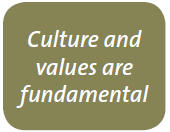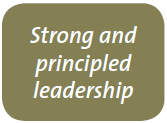Part 5: He tāngata – it's about people

5.1
Our observations in Parts 2 to 4 of this report have highlighted that being able to meet future needs requires lots of information, analysis, understanding of risk and opportunity, strategic thinking, planning, and management. All that needs people and their skills – good technical skills, thinking, and judgement.
Invest in capability at all levels
5.2
Throughout our annual audits and other assurance work, we see many highly committed and capable people working to deliver effective and efficient public services. The Public Sector Act, passed in 1912, established the principle of an independent and merit-based public service that remains an important strength of our public sector.

5.3
We find that public organisations largely have the culture and tools to support high integrity and performance. Public servants generally know what appropriate behaviour is, understand what is expected of them, and are willing to report observed behaviour that does not meet these expectations.
5.4
 However, translating public money into high-quality services and outcomes for New Zealanders means that public sector agencies must have available the right people with the right skills. Our work has found recurring themes about the capability of public entities. Management, governance, and leadership as well as the more tacit and intangible aspects of capability – organisational culture and behaviours – profoundly affect the effective, efficient, and ethical use of public sector resources.
However, translating public money into high-quality services and outcomes for New Zealanders means that public sector agencies must have available the right people with the right skills. Our work has found recurring themes about the capability of public entities. Management, governance, and leadership as well as the more tacit and intangible aspects of capability – organisational culture and behaviours – profoundly affect the effective, efficient, and ethical use of public sector resources.
5.5
Good management, leadership, and governance are important for making the changes needed to prepare well for our future. In our inquiry into the Mangawhai community wastewater scheme, we saw the effects of a local authority becoming too lean and failing to have the capacity to stay in effective control of what was done on its behalf. A public entity needs to maintain capability to properly manage its financial and other affairs and discharge its responsibilities. It needs to understand the importance of project governance and management arrangements to ensure that a steady eye is kept on the big picture.
5.6
To date, the State Services Commission's Performance Improvement Framework reviews of government departments and Crown entities have rated aspects such as leadership and governance, management of people and performance, and workforce development as weaker.
The public sector will need resilience and leadership more than ever.
5.7
Most public entities are small. Through our audit work, we see some evidence that it can be a challenge to maintain financial management capability, including preparing financial statements in keeping with accounting standards. The increased focus on long-term forecasting (see paragraphs 3.6 to 3.8) will create more demand for forecasting, financial management, and analysis skills.
Good people need to be supported by good systems
5.8
Several of our inquiries confirmed the importance of good management, leadership, and governance practice in ensuring that everything is done appropriately and is seen to be done appropriately. In these inquiries, we found that the absence of good processes had given rise to allegations of corruption.
5.9
These inquiries included looking at the decision by Hon Shane Jones to grant citizenship to Mr Yang Liu, the Government's decision to negotiate with SkyCity Entertainment Group Limited for an international convention centre, and aspects of the Accident Compensation Corporation's Board-level governance. In these instances, we found no bad intent, but people trying to do the right thing when systems did not adequately support that (such as not identifying and protecting against risks adequately).
5.10
I rarely find evidence of improper motive or considerations, collusion, or political interference in decision-making. At times, I do find that the quality of advice or information falls short of what I expected, and have been surprised to find basic and commonly accepted governance practices used irregularly. As a result, I can see opportunities for improving different aspects of governance and decision-making processes. Although, sometimes, what we find seems to be, and is, common sense, such common sense is not always put into practice.
Organisational culture matters, and needs to be carefully fostered
5.11
In recent years, large and significant changes to public sector services, structures, and systems have often been carried out quickly to create momentum and to show clearly the nature of the change that is sought. Changes, especially those that affect the staff of an organisation, need to be carried out with great care to avoid damaging the culture and values that are fundamental to an organisation's purpose. Sometimes, an organisation's culture and values have not been fully considered in times of change and we have seen loss of morale and an increase in attrition, resulting in reduced capability.
5.12
Important values, and expectations of the public, users and suppliers of services, and staff, need to be well understood and addressed in times of change. Meeting these expectations requires strong and principled leaders committed to working together. In our report, Auckland Council: Transition and emerging challenges, we noted the importance of having an integrated plan, being reliable, and delivering services in the spirit of the values expected for building trust among the public, staff, and partners.
5.13
Our third monitoring report on the response of the New Zealand Police to the Commission of Inquiry into Police Conduct shows the need to respect positive aspects of organisational culture while working to change other behaviours. The Commission of Inquiry report criticised the historical conduct, including sexual conduct, of some police officers and their associates. The Police have a good base from which they should be able to encourage a sense of pride in providing a high standard of service to all New Zealanders.
5.14
We noted the need to be mindful of cultural norms and expectations in our report, New Zealand Defence Force: The civilianisation project. Although the New Zealand Defence Force (NZDF) intended to reduce the number of military staff through the civilianisation project, it lost many more military staff than intended, which made it more difficult for the NZDF to do its job. Discharging military staff needed to be handled with great care to avoid damaging the bonds of camaraderie, integrity, and commitment that are part of the NZDF culture.
5.15
The governors and leaders of each public entity need to understand their organisation's unique values and culture in times of change and deliberately decide what to protect and what to try and change.
Scrutiny should be welcomed
5.16
Governors and leaders of public entities need to encourage staff to see scrutiny as a valuable tool, not a threat. Throughout our work as public sector auditors, particularly in our more in-depth performance audits, we find that our work goes better and delivers more value when the public entity genuinely values an external perspective.
5.17
Complaints and other feedback can be thought of in the same way – as a useful lens on how others perceive what you do. In many of our inquiries, we find that staff express concerns and people external to the organisation complain before matters are drawn to the attention of my Office, the Ombudsman, and the media.
5.18
Being receptive to an external perspective can help public sector governors and managers stand back from operational matters to recognise possible symptoms of systemic problems, and identify what can be improved.
5.19
Through our inquiries, we are finding that expectations and scrutiny of the public sector are increasing in ways we have not seen before. The public sector will need resilience and leadership more than ever.

